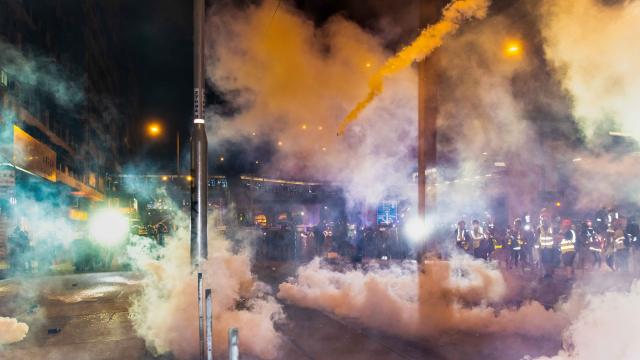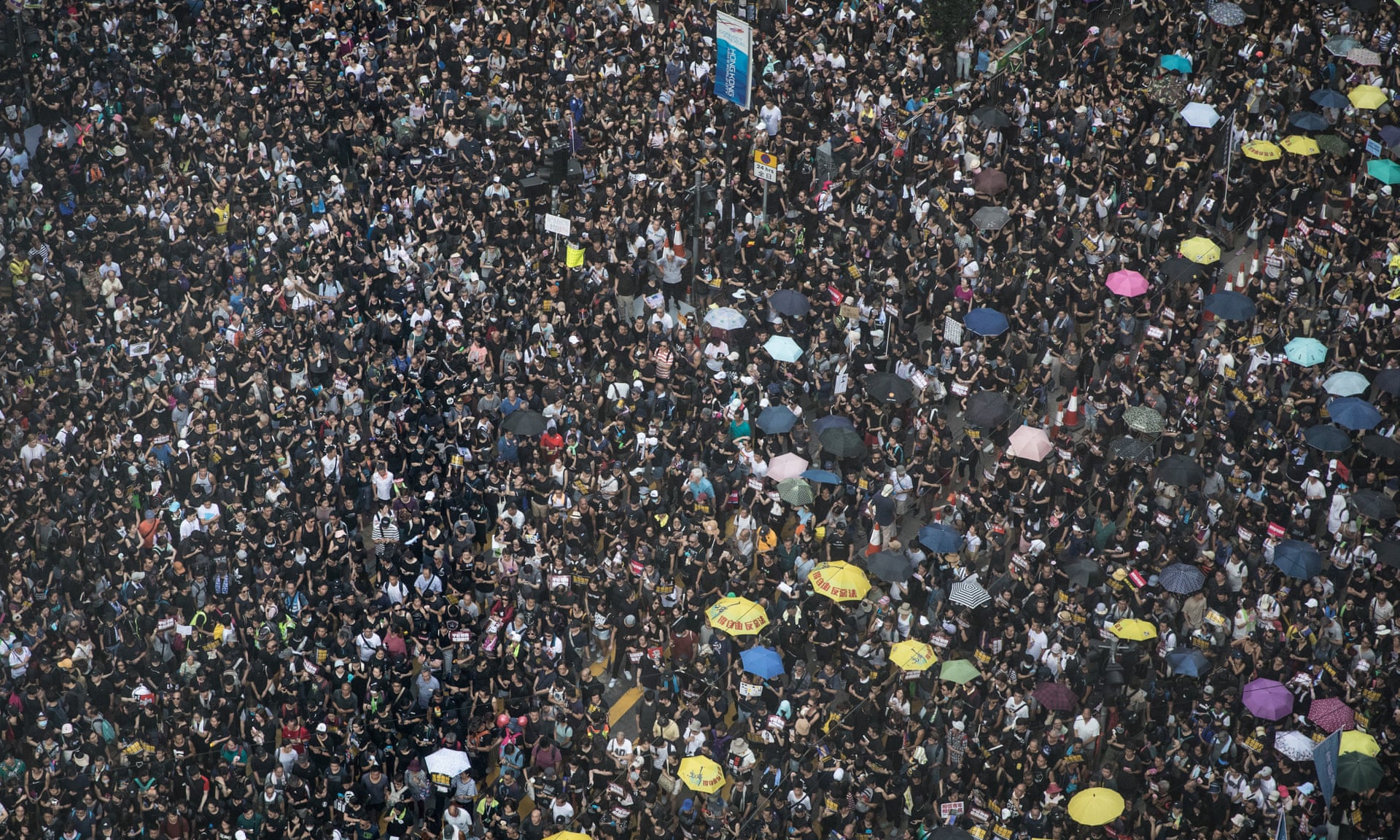
A major anti-government march in Hong Kong descended into chaos late on Sunday, as police fired teargas on protesters and unidentified masked men attacked commuters returning from the demonstration.
The protesters had surrounded China’s liaison office in the city, where they barricaded the building’s entrance and wrote graffiti its walls.
In running battles between riot police and protesters, police fired successive rounds of teargas and advanced on demonstrators who retaliated by throwing back canisters of gas and glass bottles in attempts to hold their ground. After police fired rubber bullets, the crowd eventually dispersed.
In a train station in Yuen Long, in an outer district of Hong Kong, dozens of men, some masked, beat passengers with wooden sticks.
Photos of pro-democracy lawmaker Lam Cheuk-ting, one of those attacked, showed him bleeding in the face. A female journalist who was filming the attack also appeared to have been beaten. Hong Kong public broadcaster RTHK reported that a pool of blood was left in the station lobby.
Protesters voiced anger at the delayed response by authorities to the situation in Yuen Long, with 10 police deployed to the area after the attackers had left.
The Hong Kong government condemned the violence in a statement, confirming that “some people” had attacked commuters on the station platform and within train compartments. “It led to confrontations and injuries. The [government] strongly condemns any violence and will seriously take enforcement actions.”
The government also “strongly” condemned violent acts by the protesters themselves. “These outrageous, violent acts included hurling petrol bombs, setting fires and throwing bricks … This is absolutely unacceptable to Hong Kong,” the statement said. “These outrageous, violent acts included hurling petrol bombs, setting fires and throwing bricks.”
The latest round of violence is likely to fuel further unrest in the city, where public outcry over an extradition bill has evolved into a broader protest movement against the city’s disappearing autonomy under Chinese control.
“The situation is getting worse because every time there is a protest, there is also a clash with police and every time there is a clash it gives people even more reason to come back out,” said Victoria Hui, an associate professor of political science at Notre Dame University in the US, who follows Hong Kong politics.
More than 400,000 people had taken to the streets on Sunday afternoon, in the latest outpouring of anger at the local government over a controversial extradition bill, violent police tactics on protesters, and other grievances.
Earlier on, elderly protesters holding flowers as a sign of peace pledged to stay until the younger protesters had left. Their aim was to give the flowers to the police, in hope of convincing them not to act against the crowd.
Along the route, protesters stuck colourful Post-It notes with messages condemning police violence on the barricades. “Nasty police, shame on you!” many shouted. “Hong Kong police know the law but break the law.” The crowds booed and gestured when police officers appeared on a balcony.
Thousands of demonstrators had defied the police-sanctioned route ending in a business district in central Hong Kong, and pushed westwards to Beijing’s representative office, while others occupied areas of central Hong Kong.
Facing off against police, protesters beat street signs and their helmets, responding to riot police who were beating their riot shields with batons. Plastic street barriers, traffic cones, and a ladder were set on fire near the protesters, while anti-police graffiti was scrawled in an underpass.
Protesters chanted “reclaim Hong Kong, a revolution in our time” – using the campaign slogan of a Hong Kong independence activist.
The demonstrations on Sunday were the seventh consecutive weekend when citizens have come out against the government. The protests, which began over the now-suspended bill, have grown into a wider democracy movement in the Chinese territory.
The protests pose the most direct challenge to Beijing’s authority over the former British colony since its return to Chinese control in 1997. As part of the deal, Hong Kong was meant to maintain a high degree of autonomy from the mainland, with an independent judiciary and a free press, under a framework known as one country, two systems.
But over the years, residents have witnessed their government jail activists, disqualify elected pro-democracy lawmakers, and construct expensive infrastructure physically linking Hong Kong more closely to the mainland. Chinese security agents are also believed to have abducted independent booksellers in the territory.
In response to mass demonstrations and clashes that began in early June, Hong Kong’s leader, Carrie Lam, promised the extradition bill was dead. But protesters, worried Beijing would use the bill to extradite activists and political enemies to China, are not satisfied with her language.
Protesters are calling for a formal withdrawal of the bill, as well as an investigation into alleged police brutality against unarmed protesters in previous rallies.
“The government hasn’t responded, so we just need to keep coming out,” said Catherine Sin, 21, a recent graduate who said this was the fourth protest she had attended in the past month.
Demonstrators said they do not trust Lam to keep her word, and questioned her use of language, which avoided the use of the term chit wui, or “withdraw”. Lam has said the bill will expire at the end of the legislative session that finishes next July, but protesters do not trust her to keep her word.
“That’s why we are so angry and still insist on being out here,” said Lucia Kwok, 56, who said she was attending the protests in hopes of protecting young protesters from the police.
Protesters believe the movement will continue as long as the government does not respond. Joshua Wong, a former leader of pro-democracy protests that swept the city in 2014, said: “So long as Carrie Lam doesn’t terminate the extradition bill and continues to push police to the frontline, the political crisis will continue.”
While protesters have vowed to continue until Lam meets their demands, some said they fear the movement will lose steam as demonstrations fail to produce meaningful results from the government. Residents who initially supported the movement are now worried it has turned too violent.
“I worry about the youth getting hurt. After all, they are the future of this city,” said Jimmy Sheng, 40, who runs a hotel near where police dispersed protesters.
“There is no end. In the short term I’m not optimistic, but we are doing our best. Without actual change of regime in Beijing, nothing will improve,” said Gordon Poon, a demonstrator and political commentator.













